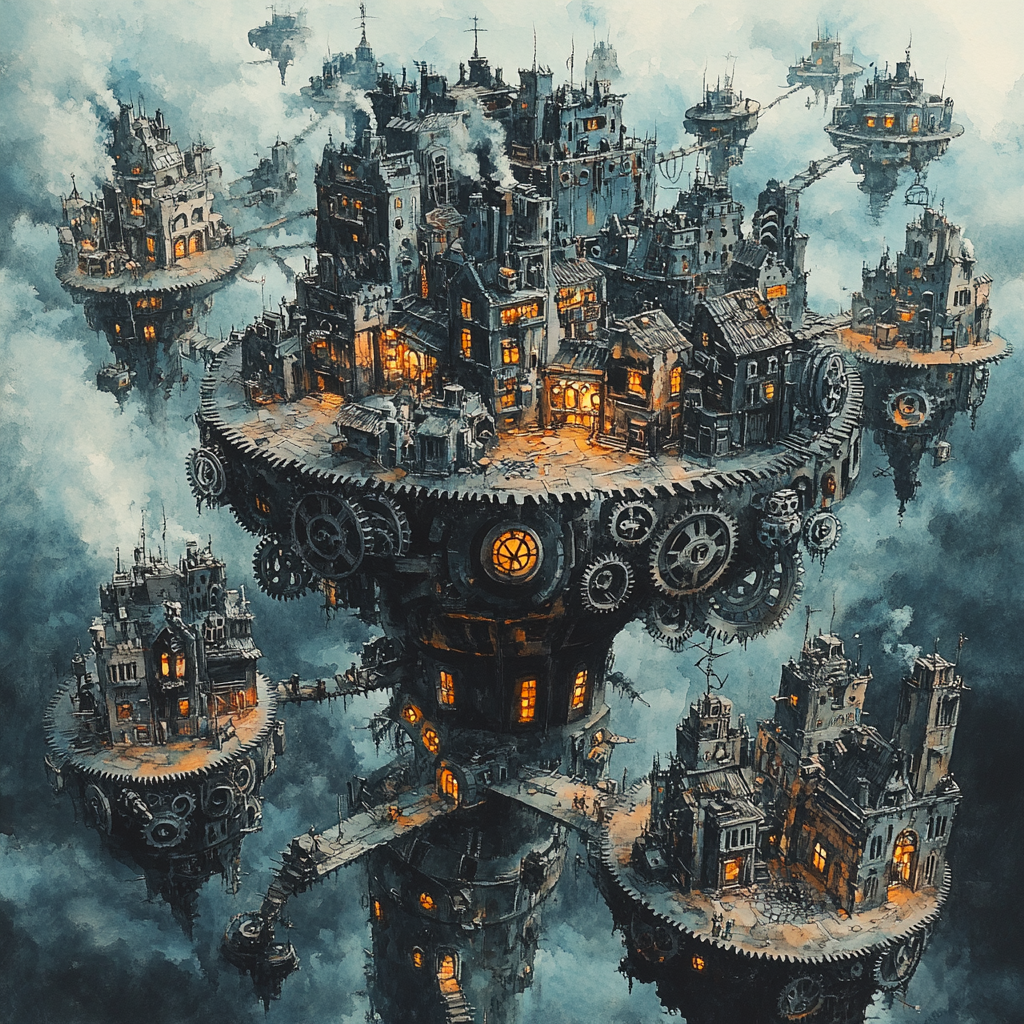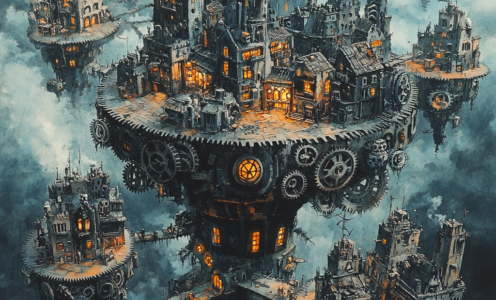Fumetown
Location: Mechanus / the depths of the plane
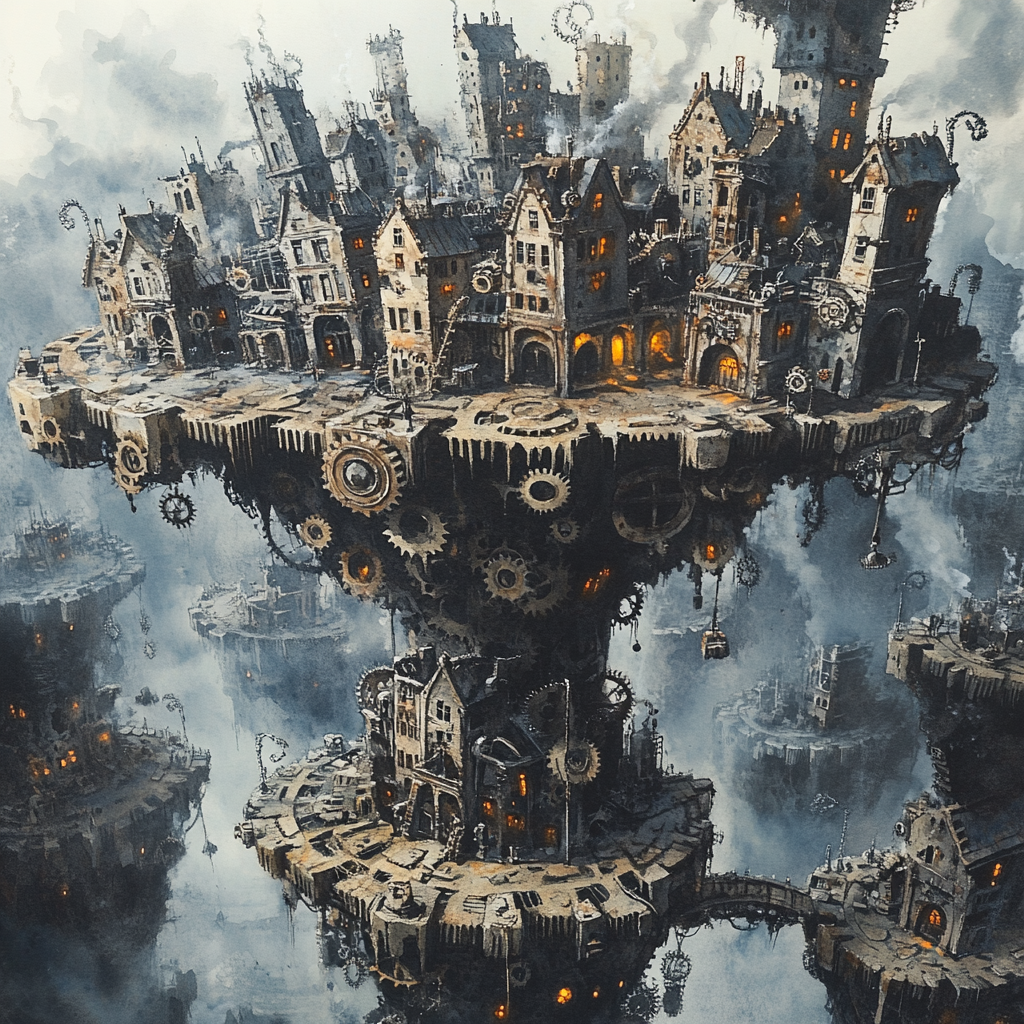
Cutter, if you were under the impression that Mechanus was all pristine gears and spotless cogs, you’ve got a shock coming. See, even in a plane of absolute order, there are places where the gears grind a bit too close and the oil doesn’t quite reach. Fumetown is one such place, tucked away deep in the recesses of Mechanus’ vast mechanical labyrinth—a festering sore in the bowels of otherwise immaculate machinery.
A dense, choking haze hangs in the air here, thick enough to cut with a blade. The cogwheels here move sluggishly, their surfaces tarnished by years of soot and grime. The incessant hiss of steam pipes venting noxious fumes drowns out the rhythmic ticking of the gears above. It’s dark here, almost perpetually so, with the occasional flicker of a malfunctioning lantern casting eerie, distorted shadows on the rusted metal buildings.
Fumetown is where the dregs of Mechanus collect—both the literal and the metaphorical. Pollutants that have no place in the polished upper levels seep down here, and with them, the poor berks who’ve found themselves out of sync with Mechanus’ unyielding order. The atmosphere in Fumetown is oppressive, both physically and mentally. Even breathing is a challenge, as every breath brings the acrid taste of burnt oil and metallic dust. The air feels heavy, as though the weight of the entire plane’s rejected filth presses down on you.
Lawless—but Not Quite
Now, calling Fumetown “lawless” is a bit of a stretch. You see, even the lowest reaches of Mechanus can’t escape the plane’s intrinsic need for order. But down here, the laws are… different. The modrons don’t patrol these parts; seems they’ve got little interest in a place that doesn’t function “smoothly”. Instead, the local denizens—disgruntled inevitables with malfunctioning directives, rogue modrons, and planewalker miscreants—enforce their own crude version of law.
It’s a place where contracts are still honoured, but only if you can enforce them yourself. Here the strong impose their will on the weak, but even then, there’s an underlying respect for the rules—however twisted they’ve become from the Mechanical ideal. A deal is a deal, after all—but in Fumetown, you better be ready to defend your interpretation of the terms with more than just words, cutter.
Why Fumetown Exists
You might wonder how a place like Fumetown came to be in a plane that prides itself on immaculate order, and more importantly, how come it hasn’t slid away from Mechanus to one of the lower or more chaotic planes? The answer, surprisingly, lies in the nature of Mechanus itself. For all its polished perfection, Mechanus is still a vast, complex machine, and like all machines, it produces waste—residual by-products of the plane’s unceasing operation. These by-products have to go somewhere, and due to the plane’s relentless adherence to efficiency, they’re shunted downwards, away from the gears that matter, to collect and fester down below. Welcome to Fumetown.
But it’s not just physical waste that finds its way to Fumetown. It’s the misfits, the damaged, the unwanted. Constructs whose logic cores have corroded over millennia of service, modrons who’ve fallen out of their rigid hierarchies, and outsiders who’ve lost their way in the Labyrinthine Portal. These beings have no place in the perfect order of Mechanus, so they gather here in Fumetown, where the laws are looser, and the plane itself turns a blind eye.
Why then do these corrupted cogs not slip out of the plane altogether? Well cutter, that’s because they have a vital purpose, and the key lies in another plane, Acheron’s second layer of Thuldanin.
The Rusty Conduit
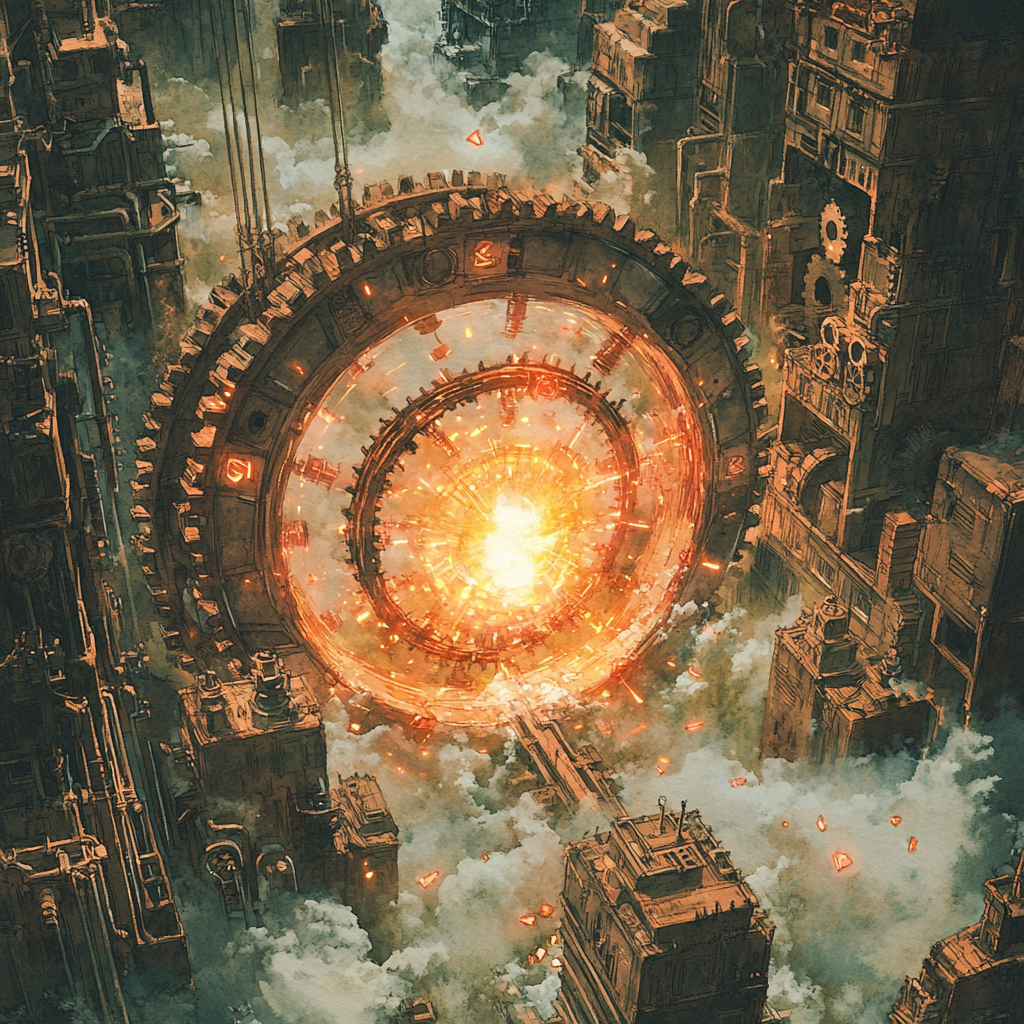
See, there’s a symbiotic relationship between Fumetown and Thuldanin, a sordid tale of discarded clockworks and forgotten detritus. In the unyielding machine of Mechanus, even the smallest cog must turn in accordance with its purpose. And when those cogs fail to meet the exacting standards of the Standard Operating Protocol, they’re shunted down into to the depths of Fumetown, where the line between refuse and resource is blurred.
Deep within the smoky alleys, beneath the creaking, corroded machinery and layers of grime, lies an ancient gate. Hidden among the rusted gearworks and festering piles of waste, is Mechanus’ secret doorway to the junkyard layer of Acheron. Thuldanin, for those not in the know, is a veritable graveyard of broken war machines, rusting weapons, and the forgotten flotsam of countless battles—a world where the discarded remnants of conflict pile up in endless, bleak junkyards.
The Rusty Conduit is peculiar construct, perfectly aligned with Mechanus’ need for efficiency, yet tainted by the chaos that inevitably comes with entropy. It opens into Thuldanin like a wound in the fabric of the plane, permitting transfer the detritus of Mechanus that has been deemed beyond repair. Some say the gate was forged by the axiomites, while others whisper of darker origins, but what’s clear is that the portal forms a crucial part of Fumetown’s grimy economy.
The Industry of Sorting and Salvage
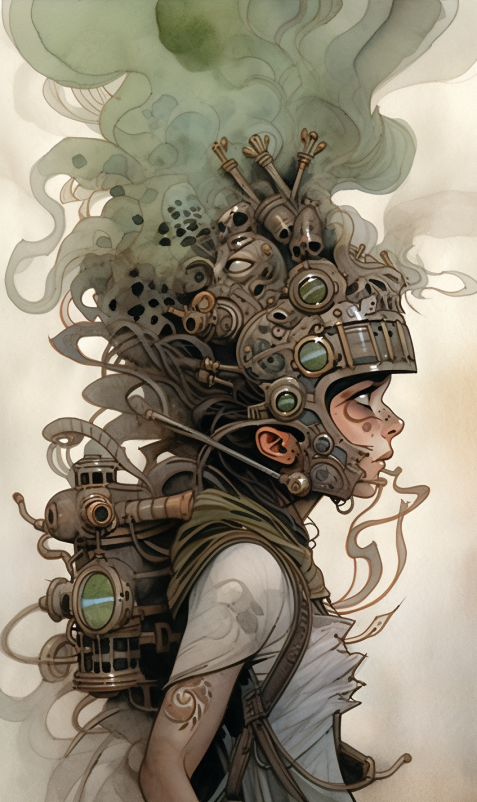
The primary industry of Fumetown revolves around the gate. The inhabitants of this burg—the poor, wretched souls who eke out an existence among the fumes—spend their days sifting through the endless tide of broken mechanisms, malfunctioning constructs, and defunct modrons. It’s a laborious process, but is done with the caution of those who know that one misstep might mean an accidental one-way trip to Thuldanin themselves.
In the maze-like alleys and corroding workshops, communities have formed around the salvaging operations. These groups, often led by the most cunning or strong-willed among them, meticulously sort through the refuse. Anything with even a hint of functionality or value is repaired, repurposed, or reassembled into something new, however crude it might be. In this, Fumetown shows a dark reflection of Mechanus’ own perfect order—where every part has a purpose, even if that purpose is to be scavenged from the wreckage of entropy.
The salvage that’s deemed utterly beyond redemption—those twisted gears and shattered automata that even the most desperate tinkerer can’t make use of—is thrown into the gate and sent to Thuldanin where it will slowly petrify, becoming one with the endless scrap heaps of that desolate plane. But not without a final check, of course. The denizens of Fumetown are thorough, if nothing else.
Living in Fumetown is, quite frankly, miserable. The air is foul, the water—if you can find any—is tainted with rust and oil, and light barely penetrates the smog. Disease is rampant, though it’s less biological and more… mechanical. Rustrot eats away at both flesh and metal, and once it sets in, it’s a slow, inevitable degradation until you’re little more than another piece of recycling.
Fumetown’s connection to Thuldanin is a necessary evil, a release valve for the inefficiencies that even Mechanus can’t completely eradicate. It’s a relationship built on mutual need—the need of Mechanus to maintain its perfection, and the need of Fumetown’s inhabitants to survive, however harsh their existence might be.
The Techno-Shamanists
A rag-tag bunch of inventors and tinkerers, the sect known as the Techno-Shamanists operates out of Fumetown. They’re more interested in crafting than politics, although their creations are easy to spot throughout the burg—and probably responsible for more than their fair share of pollution. The most respected of the bunch is a mechanised tinker gnome called Rube Codsworth, and is the closest thing to a sectol these cutters possess. More on the Techno-Shamanists here.
The Rustcatchers’ Guild

The Rustcatchers’ Guild is a unique fraternity—one that stands as the last bastion between Mechanus and a relentless, creeping threat. They’re unlikely heroes too, a ragtag assemblage of hardened souls who’ve taken it upon themselves to defend Fumetown, and indeed all of Mechanus, from one of the most insidious dangers the plane faces: the rust monsters.
Now, rust monsters are a particular kind of pest, one whose very existence seems to be a cosmic joke played on the orderly perfection of Mechanus. These creatures, drawn to metal like a Fated basher to gold, possess an insatiable appetite for all things ferrous. The chant goes that a single rust monster can reduce a pristine cog to a pile of red dust in hours, and where there’s one, there’s always more.
Thuldanin, the dumping ground of the multiverse’s discards, is a veritable banquet for these beasts. But the metal in Mechanus is far fresher and more delectable. And it’s from Thuldanin that they come, slipping through the gate to Fumetown. They’re relentless, driven by a hunger that can never be sated, and if left unchecked, they could bring even the most carefully maintained gears to a grinding halt.
Enter the Rustcatchers’ Guild—a group as grimy and tough as the streets they patrol. They’re a mix of locals, scavengers, and the occasional outsider who’s found a purpose in the filth. Armed with makeshift non-metal weapons and alchemical concoctions, they fight a never-ending battle against the rust monsters, keeping Fumetown, and by extension, Mechanus, safe from their corrosive touch.
The Guild operates under a strict hierarchy, where skill and experience are valued above all else. Their leader, a grizzled old warforged named Sprocket 7 (planar warforged fighter [they/them] / LN) , is a bit of a legend in Fumetown—partly for their unmatched record of rust monster kills, and partly for the fact that they’ve managed to keep from rusting away despite years of exposure to the grime, and the ‘monsters. They’ve got an uncanny knack for sniffing out the rusties before they can do too much real damage, and Sprocket’s leadership has kept the Guild alive through some of the worst infestations Fumetown has ever seen.
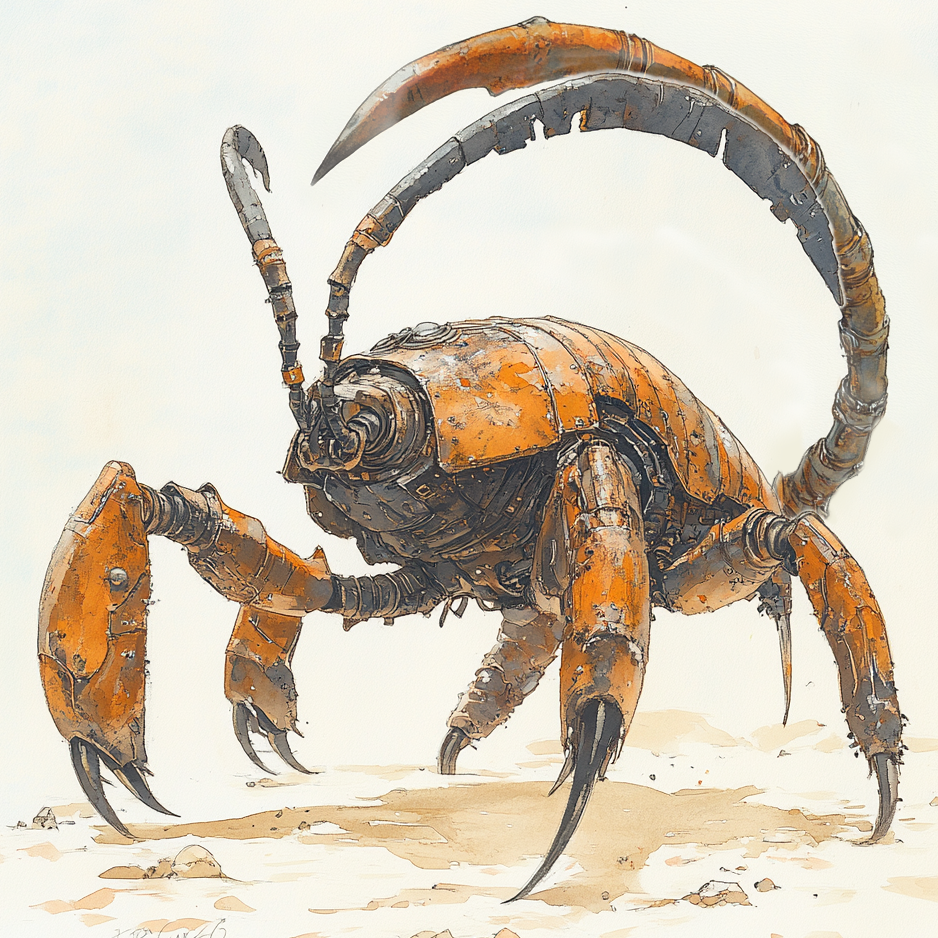
Over the years, the Rustcatchers have developed a range of defensive measures and strategies that make them formidable opponents for any rust monster foolish enough to wander into Fumetown. One of their primary tools is a concoction known as Anti-Ferrous Alkahest—a blend of alchemical ingredients that, when applied to metal, creates a temporary coating that rust monsters find repellent. The formula is a closely guarded secret, known only to the Guild’s alchemists, and its application has saved countless gears and cogs from the monsters’ ravenous maws.
The Guild also employs Rust Traps—ingenious devices crafted from the scrap that litters Fumetown. These traps lure rust monsters with a tempting morsel of metal, only to encase them in a field of magnetic energy that immobilises them long enough for a Rustcatcher to dispatch them. The traps are scattered throughout Fumetown, especially near the gate, and are checked regularly by the Guild’s members.
For more direct confrontations, the Rustcatchers favour weapons made of stone, bone, and wood—materials immune to the rust monsters’ touch. But even these weapons are often reinforced with enchanted coatings, further protecting them from corrosion from the fumes. The Guild also employs trained constructs—often salvaged and repurposed from Mechanus’ own refuse—programmed specifically to hunt down and destroy rust monsters before they can reach the precious machinery.
The work of the Rustcatchers’ Guild is unglamorous, to say the least. Their battles are fought in the dark, greasy underbelly of the plane, far from the shining gears and spotless cogs that define Mechanus’ upper reaches. They get little recognition for their efforts; most of the plane’s inhabitants are blissfully unaware of the constant threat that lurks deep below. But without the Rustcatchers, Mechanus could be a very different place—its perfect order gnawed away by the relentless appetite of rust monsters.
Despite the danger and the filth, the Guild’s members take a grim pride in their work. They know that they are the thin line between Mechanus and chaos, the unsung heroes who keep the great machine running smoothly. It’s a job that requires vigilance, courage, and a willingness to wade through the muck, but for those who call Fumetown home, it’s a job worth doing. They may be rough around the edges—covered in soot and grime, with a cynical edge that comes from years of hard living—but the Rustcatchers are a vital part of the plane’s ecosystem.
Source: Jon Winter-Holt. The name Fumetown was inspired by the excellent BBC drama podcast ‘Forest 404‘, which is well worth a listen. I may yet borrow some more ideas from this source for fleshing out Nemausus.
